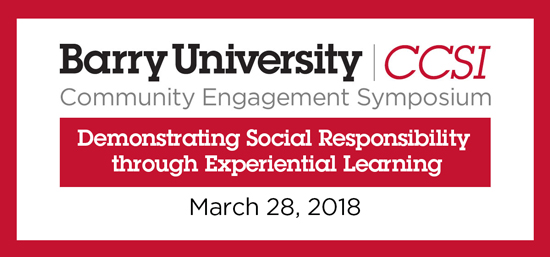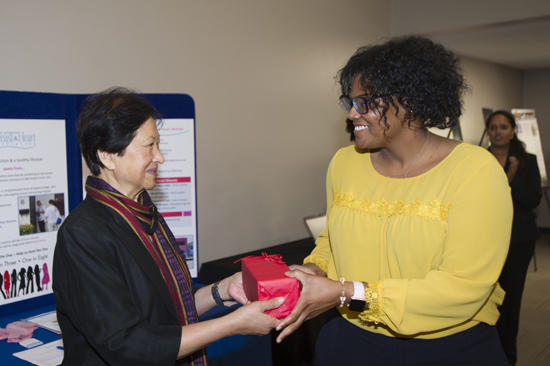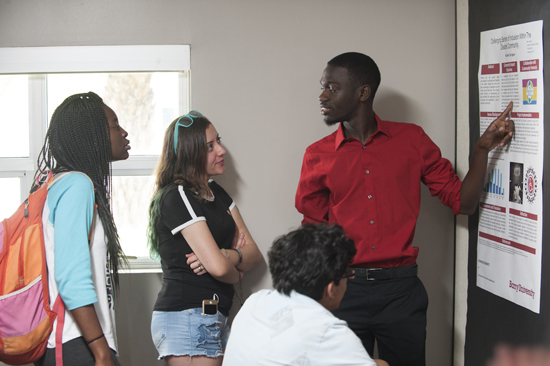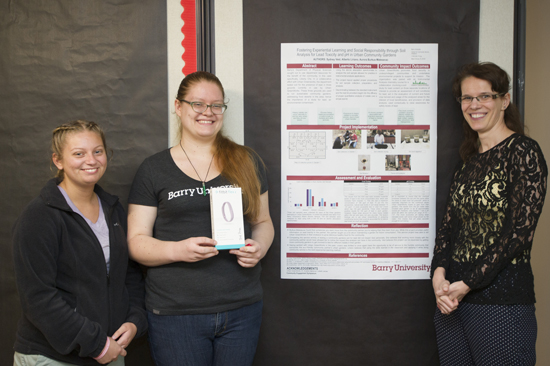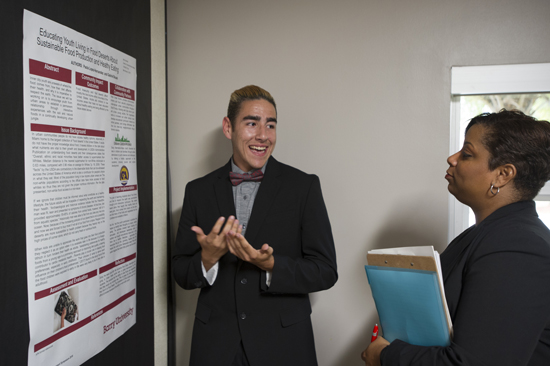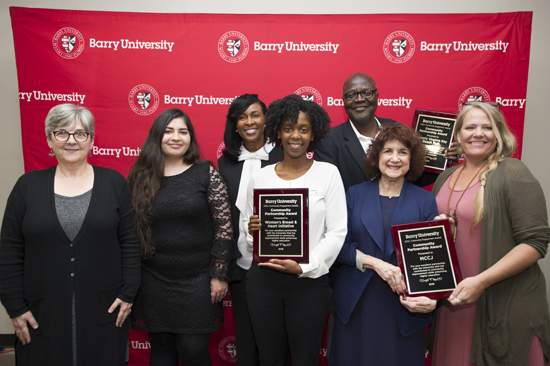|
|
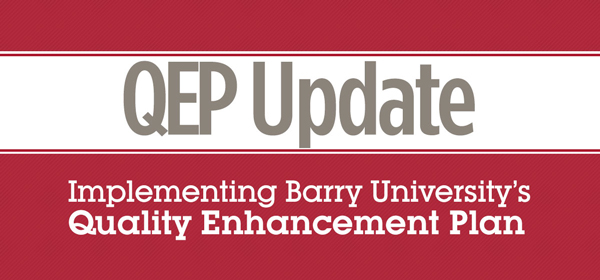
|
Community Engagement Symposium Includes Workshop, Seminar, and Poster Session
A workshop, seminar, concurrent presentations, and poster session were the main components of Barry University’s Fifth Annual Community Engagement Symposium last month. Organized around the theme, “Demonstrating Social Responsibility through Experiential Learning,” the symposium featured Nadinne Cruz, former director of the Haas Center for Public Service at Stanford University, as the lead presenter. An internationally recognized experiential learning expert, Cruz facilitated the workshop titled “Doing Justice, Making Peace in a Divided World” and the seminar on “Community Engagement as Epistemic Justice and Democratic Practice.” There were five concurrent presentations during one of the six sessions of the symposium:
The concurrent session facilitators wereDrs. Maria Alvarez, Dr. Paige Banaji, and Leticia Vega, members of Barry’s Quality Enhancement Plan (QEP) Implementation Committee; and Drs. Ricardo Jimenez and Heidi Whitford, service-learning faculty fellows. The symposium also included a Student Poster Competition, which gave students the opportunity to display their course-based and co-curricular experiential learning projects and to receive recognition for their work. Fifteen of 17 posters by students and faculty members that were on displayed during the poster session were entered in the competition. (See story below.) Provost Dr. John Murray delivered the opening address at the symposium, and Dr. Karen Callaghan, chair of the QEP Implementation Committee, gave the closing address. Organized by the Center for Community Service Initiatives, the annual Community Engagement Symposium supports the implementation and assessment of the QEP. This year’s Community Engagement Symposium Committee was composed of the following members: Dr. Glenn Bowen, chair; Dr. Sheila McMahon, proposal review subcommittee chair; Courtney Berrien, general arrangements coordinator; Liz James, registration coordinator; Daniqua Williams, poster session coordinator; Amy Deutch; Dr. Sean Erwin; and Felix Vega Pagan. |
Students Receive Poster Competition Prizes at Symposium
Barry Service Corps Fellow Dominique McMillan receives first prize from Nadinne Cruz, former director of Stanford University’s Haas Center for Public Service. McMillan’s poster featured the recovery of surplus food as a project to address food insecurity in Miami-Dade County. A Student Poster Competition was a feature of this year’s Community Engagement Symposium. The competition, which had 15 entries, was aimed at showcasing and recognizing students’ course-based and co-curricular work focused on social responsibility in the context of Barry University’s Quality Enhancement Plan (QEP). Dominique McMillan, a history major and Barry Service Corps Fellow, won the first prize of a JBL Bluetooth speaker for her poster titled “Recovering Surplus Food to Address Food Waste and Insecurity in Miami-Dade County.” Pa Sheikhn Tijan Ngom, a business management major and BSC Fellow, took home the second prize of an Amazon Firestick (for streaming media content) for his poster, “Challenging Barriers of Inclusion within the Disabled Community.” Chemistry students Aurora Burkus-Matesevac, Alberto Liriano, and Sidney Vest were the joint winners of the third prize, a Fitbit Flex 2(wearable computing device). Their poster was titled “Soil Analysis for Lead Toxicity and pH in Liberty City Community Gardens Managed by Urban GreenWorks.”
Pa Sheikhn Tijan Ngom shares information on approaches to eliminating barriers to inclusion affecting people with disabilities. Ngom won the second prize in the Student Poster Competition.
Sidney Vest and Aurora Burkus-Matesevac with Dr. Zuzana Zajickova, professor of chemistry and chair of the Department of Physical Sciences.
Saliha Nelson, chair of Barry’s Community Advisory Committee, was one of the judges for poster competition. Here she gets an overview of a poster on sustainable food production and healthy living from Gabriel Bounani, a Business Management major and Barry Service Corps Fellow. Nadinne Cruz, former director of the Haas Center for Public Service at Stanford University and a nationally recognized service-learning pioneer, handed out the prizes during the closing session of the event on March 28. Cruz was the lead presenter at the symposium. Three members of Barry’s Community Advisory Committee – Saliha Nelson (chair), Heather Burdick, and Linsey Harris Smith – as well as Fabio Naranjo, a social work faculty member, served as judges. They used such criteria as content, relevance, and visual appeal to assess the entries in the competition. Barry’s QEP is titled “Fostering Personal and Social Responsibility through Experiential Learning.” QEP Project Assistant Daniqua Williams was the poster session coordinator. The Fifth Annual Community Engagement Symposium was held on March 28 with the theme, “Demonstrating Social Responsibility through Experiential Learning.” |
Faculty Workshop on Personal and Social Responsibility Set for Next MonthThe QEP Implementation Committee will host a faculty development workshop next month. Scheduled for May 9 and 10, the workshop will be focused on the personal and social responsibility outcomes of the Quality Enhancement Plan. The sessions will begin at 10 a.m. each day. Topics to be covered include “Backwards Design: A Critical Look at Outcomes, Topics, and Assignments”; “Academic Discourse”; “Active Learning in the Classroom”; and “Experiential (Critical) Teaching and Learning.” Dr. Karen Callaghan, dean of the College of Arts and Sciences and chair of the committee, is coordinator of the workshop. In addition to Callaghan, the workshop session facilitators will be Dr. Tamara Hamilton, an associate dean in the College of Arts and Sciences and professor of chemistry; Dr. Paige Banaji, director of first-year writing and assistant professor of English; Dr. Glenn Bowen, executive director of the Center for Community Service Initiatives and director of the QEP; and Liz James, experiential learning coordinator. For further information and to register for the workshop, contact Callaghan at kcallaghan@barry.edu. |
Alternative Break Program Given “PSR” Designation
Another co-curricular program has been added to the “PSR” (personal and social responsibility) list. At its meeting on April 16, the QEP Implementation Committee approved the designation for Alternative Breaks. Overseen by the Center for Community Service Initiatives (CCSI), the Alternative Break program provides students with community-based immersion experiences designed to build awareness of social, political, and environmental issues through learning, reflection, and service that benefits diverse populations. Participants are encouraged to develop empathy, understanding, and motivation towards action for social justice in local, regional, national, and global contexts. Through the program, students develop leadership skills such as effective communication, intercultural knowledge, and critical thinking as well as a long-term commitment to civic engagement. Moreover, students form friendships with one another, build beneficial relationships with faculty and staff advisors, and collaborate with community leaders to address issues in a meaningful way. The co-advisors for the program are Courtney Berrien, associate director of the CCSI, and Dr. Sean Buckreis, an associate professor in the School of Education. The PSR designation indicates that a course, or a co-curricular program or event, meets the criteria by intentionally emphasizing elements of personal and social responsibility such as ethical behavior, perspective consciousness, and civic engagement. Eight co-curricular programs and events were previously given the “PSR” designation. |
QEP Implementation Committee Congratulates Community Partners
Recipients of the Community Partner Award are pictured here with Dr. Karen Callaghan, chair of the QEP Implementation Committee (left). Andrea Ivory, executive director of the Women’s Breast & Heart Initiative (third from left), and Heather Burdick, program director at MCCJ, are members of Barry’s Community Advisory Committee. The QEP Implementation Committee has congratulated the community partners honored at Barry’s Community Engagement Awards on March 28. The committee singled out MCCJ and the Women’s Breast & Heart Initiative, two of the recipients of the Community Partnership Award. Heather Burdick, program director at MCCJ, and Andrea Ivory, founder and executive director of the Women’s Breast & Heart Initiative, are members of the university’s Community Advisory Committee. Historic Virginia Key Beach Park also received the Community Partnership Award at the event. Dr. Karen Callaghan, dean of the College of Arts and Sciences and chair of the QEP Implementation Committee, presented plaques to the three winners in the Community Partnerships category. At the same event, Saliha Nelson, vice president of URGENT, Inc. and chair of Barry’s Community Advisory Committee, presented the Community Impact Award. The winners of that award were three students: Wills Compere, Presler Maxius, and Paris Razor. Community Advisory Committee member Ezra Dieuveille attended the awards ceremony, which was hosted by the Center for Community Service Initiatives. The Community Advisory Committee supports the implementation of Barry’s Quality Enhancement Plan, or QEP. Committee members share their knowledge, experience, and expertise with the university. |
|
If you wish to unsubscribe or update your email subscription, please visit our email preference center. ©2018 Barry University. All Rights Reserved. |

